
Good morning, Q-MHI readers!
WHAT TO WATCH FOR TODAY
Kim Yong Chol meets Mike Pompeo.
The general and the US secretary of state will discuss the June 12 summit between Donald Trump and Kim Jong Un. Kim Yong Chol is the highest ranking official to visit the US since 2000; he was blamed for masterminding the 2010 sinking of a South Korean navy ship that killed 46 sailors and the shelling of an island, which killed a handful of soldiers and civilians. Kim is blacklisted by both the US and South Korea.

In the recent summit at the Demilitarized Zone (DMZ) between the leaders of North and South Korea, Kim was also part of the North Korean delegation.
Trump wrote a letter last week informing North Korea that the summit between the two countries, slated for June 12 in Singapore, was off—but that seems to have spurred all parties to step up their diplomatic efforts. Days ago, South Korean president Moon Jae-in held a surprise meeting on the north side of the DMZ with Kim Jong Un, prompting Trump to respond that the US was considering “reinstating” the summit. After that meeting, the US sent a delegation headed by veteran diplomat Sung Kim to meet with North Korean officials at the DMZ. Talks are also being held in Singapore between the US and North Korea, led by White House deputy chief of staff for operations Joe Hagin, and Kim Chang Son, Kim Jong Un’s de facto chief of staff.
The United States and South Korea have blacklisted the delegation leader, old military stalwart Kim Yong Chol, for supporting the North’s nuclear and missile programs.

However, South Korea had decided to accept the delegation for the good of the Games, a presidential official in Seoul said on condition of anonymity.The official said South Korea had informed the United States of the visit and they were in talks about Kim Yong Chol’s entry into the South.
Another top North Korean official, Ri Son Gwon, will travel with Kim Yong Chol for the closing ceremony. Ri, who is also involved in inter-Korean affairs, accompanied leader Kim Jong Un’s sister on her visit.The eight-member delegation coming to the closing ceremony would travel by road and would meet South Korean President Moon Jae-in, an official in Moon’s office said.
Kim Kardashian meets Trump.

The reality TV star will reportedly discuss prison reform with Trump’s son-in-law Jared Kushner in the White House, before meeting Trump, whom she plans to ask to pardon a woman serving a life sentence for a first-time drug offense. According to a person familiar with the meeting, Kardashian plans to ask Trump to pardon a woman serving a life sentence without parole for a first-time drug offense. (White House staffers have joked about who will get to accompany her to the West Wing, and what they should wear for the occasion. The White House did not immediately respond to requests for comment.)
Prison reform is an issue near and dear to Kushner, whose father, Charles, spent more than a year in a federal prison camp in 2005 and 2006 on charges of tax evasion, illegal campaign contributions, and witness tampering. The experience left an indelible mark on the young Kushner who, for years, carried a wallet his father made for him in prison; when he joined the White House as senior adviser, he vowed to help improve the system that his father had come through. And so, while other initiatives in his once-dizzying portfolio have fallen by the wayside, Kushner has made significant progress in getting Republican lawmakers on board with the effort, bringing law enforcement officials and Evangelical leaders to the White House, taking meetings on Capitol Hill, and hosting dinner parties with key Washington power players at the home he shares with his wife,

Ivanka Trump. He pushed Congress to support a bipartisan bill known as the First Step Act, which aims to better prepare inmates to re-enter society by incentivizing participation in job-training and drug-treatment programs, and which would also give nonviolent offenders more options to serve the ends of their sentences in halfway houses or home confinement. (Kushner’s father left prison 10 months early, and finished his two-year sentence at a halfway house in Newark, New Jersey.)
Brazilian oil workers strike.
The planned 72-hour strike was declared illegal by the top labor court on Tuesday, but the country’s biggest oil-workers union says it’s going ahead. It’s a blow to president Michel Temer, coming right after a week-long truckers’ strike that brought Brazil to a standstill.
The strike by workers demanding changes at state-led oil firm Petroleo Brasileiro SA is the latest challenge for the company known as Petrobras, whose shares have tumbled nearly 30 percent in two weeks over fears that political interference would unwind recent investor-focused policies.
The economic and political storm has shaken the lame duck Temer government ahead of October elections and rattled nerves about the path forward for Petrobras, Latin America’s biggest oil producer.
It has also raised the spectre of protests spreading to more sectors as Brazilians vent frustration with the unpopular government and an uneven economic recovery.
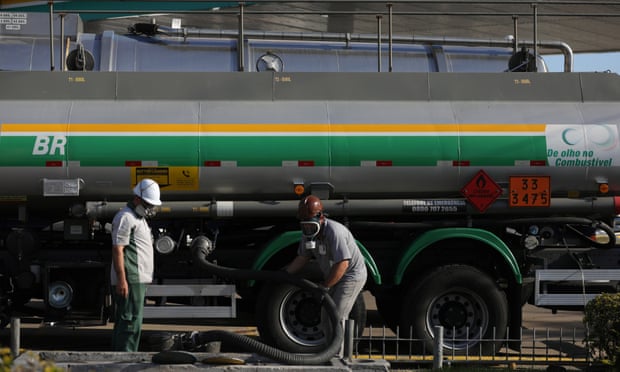
With truckers protesting over high diesel prices, government sources told Reuters on Tuesday that Temer had been considering scrapping a market-based fuel pricing policy at Petrobras. But by Wednesday morning the president’s office issued a statement saying he would preserve the policy.
Striking truckers in Brazil have disrupted supplies and exports from one of the world’s agricultural powerhouses, triggering the premature slaughter of millions of chickens as feed failed to reach farmers.
The strike over high fuel prices has paralyzed Brazil, the top global exporter of soybeans, sugar, coffee and chicken. Industrial action could spread to the country’s oil sector on Wednesday, when workers plan to start a 72-hour strike.

Farmers and merchants in Latin America’s largest economy have been unable to get their supplies to port during the nine days of industrial action. The strike has been slow to unwind even after the government agreed to subsidize diesel prices in a bid to end protests.
Losses to farmers alone so far in the strike are estimated at 6.6bn reais ($1.76bn, £1.33bn), the country’s CNA farm lobby said on Tuesday, adding that it could take farmers six months to a year to recover from the impact of the protest.
WHILE YOU WERE SLEEPING
Martin Sorrell is back.

Just six weeks after he was ousted from WPP for alleged wrongdoing, Sorrell will become the executive chairman of Derriston Capital (paywall), a UK-listed shell company, and plans to buy advertising businesses. He’s still a major WPP shareholder.But the ad industry is now roiled by concerns about their futures, much of it linked to the reshaping of advertising accelerated by the tech giants. WPP shares are down about 30% over the past 12 months; client billings fell 5.4% in 2017 on a like-for-like basis. And hedge funds are among those betting things will get even worse, placing bets (paywall) against Sorrell’s company and its competitors.

Sorrell has said the company got “walloped” last year by lower spending on advertising by its clients. Procter & Gamble, one of WPP’s biggest, is among those slashing spending on agency work. And media publishers and management consulting firms, themselves under attack, are trying to take on some of the work that advertising and creative agencies like WPP traditionally performed.

Facebook and Google will take in 56.8% of digital ad spending in the US this year, according to research firm eMarketer. WPP spends on those platforms on behalf of clients, taking a cut—Sorrell has said WPP spent about $5 billion with Google and $2 billion with Facebook last year.But the shift to more automated ad buying also undermines any opportunity for advertising groups to add to their profits, and the rapidity of changing consumer media and spending habits has made it hard for the largest ad groups to adapt.
While Sorrell has said that Google and Facebook have become “friendlier frenemies,” at least in part because of government pressure on them, he also noted another US tech giant, Amazon, and its potential impact on advertising kept him awake at night.
The Belgian gunman killed someone the day before the Liège attack.

Benjamin Herman, who shot dead two police officers and a bystander yesterday, allegedly bludgeoned a man to death on Monday, according to Belgian interior minister Jan Jambon. Jambon said the murdered man had done jail time with Herman.
The victim was a former prisoner and convicted drug dealer, Michael Wilmet, 30, who was found with injuries consistent with being attacked by a blunt instrument to the head.

Herman was killed in a shootout with police on Tuesday after stabbing two female police officers as they checked parking meters and then shooting them dead with one of their service revolvers.He also shot dead Cyriel Vangriecken, 22, a student at the University of Liège, who was in the passenger seat of his mother’s Ford Fiesta which was stopped at a red light close to the site where the officers had been killed.Herman subsequently took a cleaner at a school hostage, before being shot himself as he tried to flee the building.
Trump and the Mexican president reignited the border wall spat.

After Trump told a rally in Nashville that Mexico would pay for the wall in the end, president Enrique Peña Nieto swiftly hit back on Twitter, writing: “Mexico will NEVER pay for a wall. Not now, not ever. Sincerely, Mexico.”
The wall was a favourite campaign theme of Trump’s and has been a longstanding bone of contention with Mexico.
“In the end, Mexico is going to pay for the wall,” Trump told the crowd. “They do absolutely nothing to stop people from going through Mexico, from Honduras and all these other countries … They do nothing to help us.”
About an hour later, Mexico’s President Enrique Pena Nieto took to Twitter to hit back.
“President @realDonaldTrump: NO. Mexico will NEVER pay for a wall. Not now, not ever. Sincerely, Mexico (all of us),” Pena Nieto wrote in English. He then repeated the tweet in Spanish.
The United States, Mexico and Canada are locked in tortuous negotiations to rework the North American Free Trade Agreement (NAFTA) and are also seeking to avoid a potential stand-off over U.S. threats to impose steel and aluminium tariffs.
The US tightened restrictions on Chinese visas.

To help counter the alleged theft of US intellectual property, authorities said they will limit visa durations for Chinese grad students involved in fields including robotics, aviation, and high-tech manufacturing.
Such areas of study were marked as priorities by China’s “Made in China” 2025 manufacturing plan, according to the AP.
President Trump had said that such changes could happen in a national security strategy issued in December.
Chinese citizens seeking visas who work as researchers or managers for specific companies flagged by the U.S. Commerce Department will need special clearance from a number of U.S. agencies, according to the AP.
The State Department said the visa application process won’t change. However, an official told the AP that clearances are expected to take months.
The new policies come as Trump renews his threat to place 25 percent tariffs on $50 billion worth of Chinese goods.
A report detailed “crimes against humanity” by Nicolás Maduro’s government.
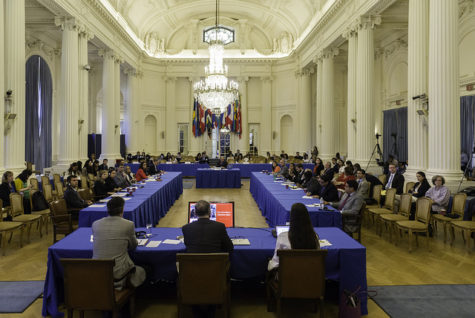
The Organization of American States’ report documents thousands of extra-judicial killings and arbitrary detentions in Venezuela under the strongman’s rule. It was presented to the International Criminal Court, which announced a preliminary investigation.
The international panel designated by the OAS secretary general included Argentine Santiago Canton, Canadian Irwin Cotler and Costa Rican Manuel Ventura.They drew their conclusions after five hearings held at the OAS headquarters in late-2017 with testimony from 26 witnesses. They collected documents from victims, relatives of victims and more than 40 non-governmental and international organizations.
Venezuelan diplomats in Washington fired back saying the findings were prepared by “anti-Venezuelan activists” relying on testimony of “criminal fugitives.”It is part of a “propaganda campaign against the Venezuelan state, whose sole objective is to overthrow the Constitutional Government of President Nicolas Maduro,” Venezuelan diplomats said in a statement.
Maduro in recent days won an election to a second six-year term as president in a vote his leading challenger called fraudulent and banned opposition parties rejected as an illegitimate victory.

The panel presented its report after the prosecutor of the International Criminal Court, Fatou Bensouda, announced a preliminary investigation had been launched into alleged crimes committed by Venezuelan police and security forces.A preliminary investigation is the first step toward a possible full investigation that could lead to charges before the international court.

The International Criminal Court, governed by an international treaty called the Rome Statute, is the first permanent international criminal court. It investigates and prosecutes individuals accused of genocide, war crimes and crimes against humanity.Venezuela was the first Latin American country to ratify the Rome Statute in December 2002.
Q-MHI OBSESSION INTERLUDE
Marc Bain on Balenciaga’s $1,290 “t-shirt shirt.”

“It doesn’t seem to be made of extraordinarily expensive materials, and it doesn’t look like it was an unusually complex garment to put together. For explanation, maybe it’s enough to know that Balenciaga’s artistic director, Demna Gvasalia, clearly enjoys toying with people’s notions of what fashion, luxury, and beauty should be.”
MATTERS OF DEBATE
Ethiopia is the China of Africa.

The two ancient nation-states share a grand vision for the future (paywall).Will Ethiopia become “the China of Africa”? The question often comes up in an economic context: Ethiopia’s growth rate is expected to be 8.5 percent this year, topping China’s projected 6.5 percent. Over the past decade, Ethiopia has averaged about 10 percent growth. Behind those flashy numbers, however, is an undervalued common feature: Both countries feel secure about their pasts and have a definite vision for their futures. Both countries believe that they are destined to be great.
China and Ethiopia intersect in yet another way, with the Chinese helping to build the place up. There are new and modern apartment buildings scattered around Addis Ababa, built by the Chinese, a light rail system in Addis that would look nice in any country, impressive dams for hydroelectric power, and a high-speed rail connection to Djibouti and the coast.
Your multivitamins aren’t helping you live longer.

For most people, there is no reason to take them.A meta-analysis published yesterday (May 28) looked through all the randomized studies from Jan. 2012 to Oct. 2017 on multivitamins, some combination pills that include one or two vitamins like calcium and vitamin D, and their connection to heart disease. After narrowing the dataset to just the 179 randomized-controlled studies—the highest standard of medical research—the researchers determined that “conclusive evidence for the benefit of any supplement across all dietary backgrounds (including deficiency and sufficiency) was not demonstrated.”
The meta-analysis found that some individual vitamins may have associated benefits or risks. Folic acid, for example, seemed to lower risk of heart disease. Antioxidants and niacin, or vitamin B-3, were found to increase the risk of death ever so slightly. But without a causal mechanism, or more specific data, the evidence isn’t enough to say that anyone should or shouldn’t take supplements with those ingredients. Some people who take niacin as a prescription to control their cholesterol, in fact, may still benefit greatly from taking it every day.
But multivitamins—not so much. “Our review found that if you want to use multivitamins, vitamin D, calcium, or vitamin C, it does no harm—but there is no apparent advantage either,” David Jenkins, a nutritionist at the University of Toronto and St. Michael’s Hospital, said in a statement.
Donald Trump is using “salami tactics” to take control of the Russia probe.
He’s slicing away at the FBI’s independence by forcing it to make small concessions rather than stage a total confrontation.
Hungarian communist leader Mátyás Rákosi later wrote, Hungary’s communists wanted full control of the state, but had to leave their goal ambiguous at the outset, because “discussion of a dictatorship of the proletariat as our final aim would have caused alarm among our partners in coalition.” They initially joined a broad coalition of parties to run the government, but in progressive steps, they would demand the ouster of the most objectionable members. “This work we called ‘Salami Tactics’, by which we cut out in slices reaction hiding in the Smallholders’ Party,” he explained. Eventually, Rakosi’s party had sliced away enough that the opposition could no longer stand in the way of their gaining complete power.

To the extent President Trump has a conscious strategy against the Russia investigation, this is it. If Trump had baldly demanded a year ago that he be handed full control over the prosecutorial powers of the Justice Department, many of his coalition partners (Republicans in Congress) would have revolted. Instead he has encroached step by step upon the Department’s independence. At each step, his opponents have had to choose between giving him one more slice of salami and staging an irrevocable breach. The salami is getting shorter, and Trump’s final demands are drawing closer.

In the meantime, Trump’s disguised ends are growing increasingly naked. Over the weekend, Trump’s lawyer Rudy Giuliani called the Mueller investigation “illegitimate.” Rather than denying that Trump’s campaign colluded with Russia, he is portraying collusion as some murky and undefinable act. “Look, you can’t say you’re spying on the Russians if what you’re trying to do is to show the Russians are colluding, whatever the hell that means, with the Trump campaign,” he told Bill Hemmer. “You go out to the outer orbit [of the campaign], how do I know what’s going on?,” he declared on CNN. “But I don’t think that would matter. You can’t, you know, there’s just collusion with a guy 50 rungs down on the campaign? Not that I’m saying it happened, but if it did, I don’t know what that means.”
So now Giuliani is simultaneously all but conceding that members of the Trump campaign colluded with Russia, and calling the entire investigation illegitimate. Trump’s defensive line on the facts of the case is retreating at the same moment his procedural attack on the investigation is advancing. Republicans are converging on the position that they have the right to decide which laws matter and who should be investigated.
SURPRISING DISCOVERIES
Thailand is the new dumping ground for the world’s e-waste.

It’s being rerouted to the Southeast Asian country after China banned imports of discarded electronics.
Police at Laem Chabang port, south of Bangkok, showed on Tuesday seven shipping containers each packed with about 22 tonnes of discarded electronics, including crushed game consoles, computer boards and bags of scrap materials.Electronic refuse, or e-waste, is turning up from Hong Kong, Singapore and Japan, police said, some of it imported by companies without the required permits.”This … shows that electronic waste from every corner of the world is flowing into Thailand,” Deputy Police Chief Wirachai Songmetta said as he showed the containers to the media.

While “e-waste” — defined as any device with an electric cord or battery – can be “mined” for valuable metals such as gold, silver and copper, it can include hazardous material such as lead, mercury and cadmium.Police said they filed charges against three recycling and waste processing companies in Thailand. Anyone found guilty could be jailed for up to 10 years.
“The companies that we have filed charges against don’t have a quota to import even a single ton of electronic waste,” Wirachai said.
A New York court ruled that a McDonald’s restaurant wasn’t one of its managers’ “place of business.”

Being the boss versus an employee can lessen the penalty for unlicensed gun possession in the workplace. At a nearby hospital, however, staff reported to police that someone in a McDonald’s uniform was being treated for a gunshot wound. When cops went to the hospital and questioned Wallace, he claimed he was shot at a bus stop on the way to work. But an intrepid officer went back to the fast-food restaurant, spotted bloodstains, and pressed employees for the truth. They admitted the shooting.
Wallace was soon charged and convicted of felony possession of an unlicensed firearm. He argued on appeal that his offense was merely a misdemeanor, based on an exception in New York law that lessens the penalty for unlicensed gun possession in one’s “place of business.” The exception exists in recognition of a merchant’s special need for protection, though it undermines New York’s strict gun licensing mandates somewhat.
The case turns on the definition of a “place of business” and just who qualifies for this exception. Wallace said he should qualify because he was a manager at work; McDonald’s was his place of business. The trial court disagreed, as did an appeals court panel. But one dissenting judge on the panel saw Wallace’s point of view, writing that the statute was unambiguous and that if “the legislature had wanted to limit the places of business to which the exception…applies, it could easily have done so.”
The dissenting judge allowed Wallace to appeal to New York’s highest court. There, the manager’s arguments failed again. The Court of Appeals looked to separate gun licensing rules and reasoned that the gun possession exception doesn’t apply to every employee, just “when such person is a merchant, storekeeper, or principal operator” of an establishment. In other words, McDonald’s wasn’t his place of business, even if it was where Wallace worked, and even if he was a manager.
The first cyberattack used the telegraph.
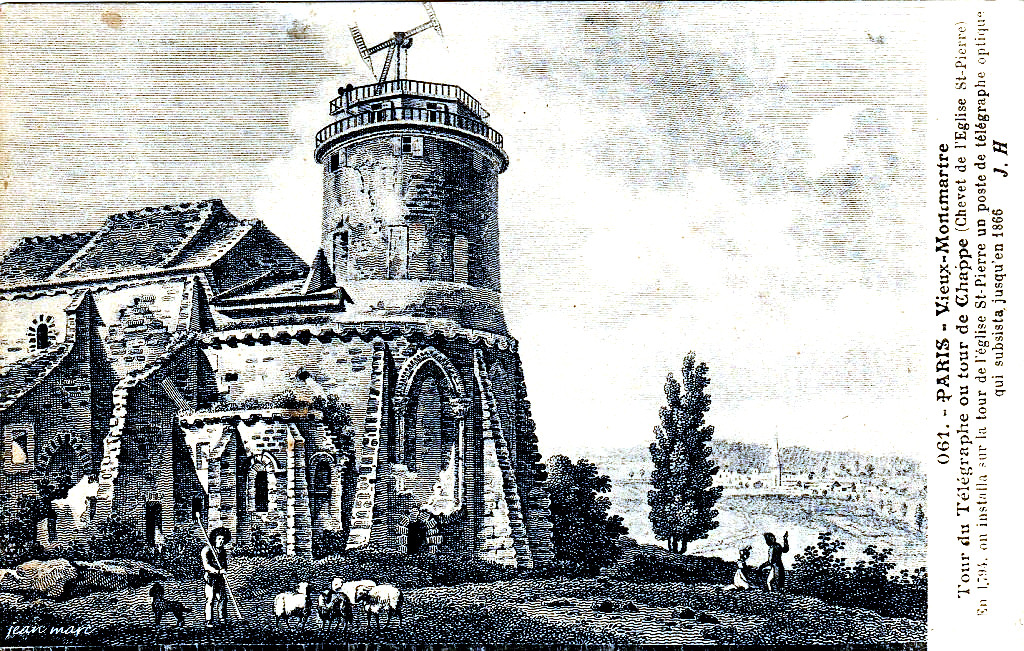
Shady bankers wired false information to get an upper hand in bond-market trading back in 1834.France created a national mechanical telegraph system in the 1790s; in 1834, a pair of crooked bankers named François and Joseph Blanc launched the first cyberattack, poisoning the data that went over the system in order to get a trading advantage in the bond market.
Tom Standage has a great stock-in-trade in this kind of story; his 1998 book The Victorian Internet was a fabulous look at the parallels between the telegraph bubble and the internet bubble of the late 1990s; his 2006 essay cataloged the predecessors of the moral panic over video games (like the waltz and the novel); he’s written about the great handwringing over the Facebook of the 17th century (cafe society); and his 2013 book The Writing on the Wall traces “the first 2,000 years of social media” (“from the papyrus letters that Roman statesmen used to exchange news across the Empire to the advent of hand-printed tracts of the Reformation to the pamphlets that spread propaganda during the American and French revolutions”).
Exam results are worse in hot weather.
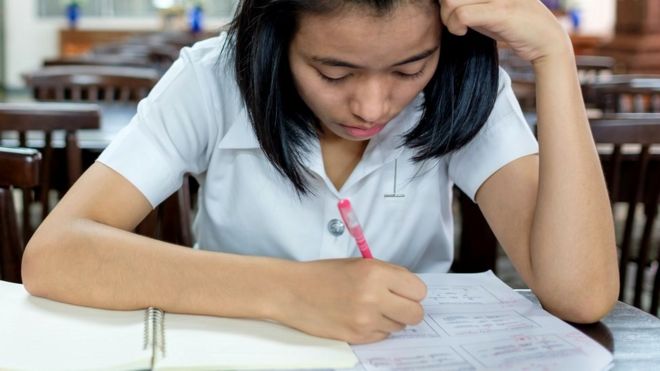
A Harvard and other US universities study of 10 million US secondary students found hot weather negatively impacts their test performance.There is a “significant” link between higher temperatures and lower school achievement, say economic researchers.
An analysis of test scores of 10 million US secondary school students over 13 years shows hot weather has a negative impact on results.The study says a practical response could be to use more air conditioning.Students taking exams in a summer heat wave might have always complained that they were hampered by the sweltering weather.
But this study, from academics at Harvard, the University of California Los Angeles (UCLA) and Georgia State University, claims to have produced the first clear evidence showing that when temperatures go up, school performance goes down.Researchers have tracked how secondary school students performed in tests in different years, between 2001 and 2014, across the different climates and weather patterns within the US.
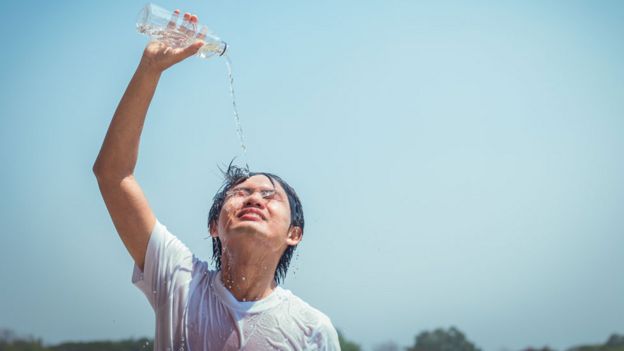
The study, Heat and Learning, suggested that hotter weather made it harder to study in lessons in school and to concentrate on homework out of school.Researchers calculated that for every 0.55C increase in average temperature over the year, there was a 1% fall in learning.
Colder days did not seem to damage achievement – but the negative impact began to be measurable as temperatures rose above 21C.The reduction in learning accelerated once temperatures rose above 32C and even more so above 38C.
Authorities warned against roasting marshmallows over Kilauea’s lava.

It’s insanely dangerous and would taste terrible anyway.
The U.S. Geological Survey took a break from giving serious updates about Hawaii’s Kilauea volcanic eruption to confirm that no, you should not roast marshmallows over the scorching hot volcanic vents.
The USGS responded to one twitter user who asked, “Is it safe to roast marshmallows over volcanic vents? Assuming you had a long enough stick, that is? Or would the resulting marshmallows be poisonous?”
“Erm,” the USGS replied. “We’re going to have to say no, that’s not safe. (Please don’t try!)”Not only would it be unsafe, the USGS said, but the marshmallows would simply taste bad. The vent could be releasing sulfur dioxide or hydrogen sulfide — which both emit not-so-pleasant smells — and the sulfuric acid from vog, or volcanic smog, could create a “pretty spectacular reaction,” the USGS said.
Q-MHI 









Tidak ada komentar:
Posting Komentar